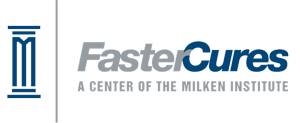"Partnering for Cures" Panel: Patients Should Have Control of Their Own Data
By Varun Iyengar and Lisa Vance
Twitter summary: Summary of FasterCures panel on patient data-sharing
 Our team recently attended the seventh annual Partnering for Cures meeting in New York. The event – organized by FasterCures, a center of the Milken Institute – connects hundreds of decision-makers in healthcare to reduce the time and cost of getting new therapies from the research phase to patients. Perhaps our biggest takeaway was how stakeholders in medicine are truly beginning to recognize that patients should be the most involved stakeholders in healthcare.
Our team recently attended the seventh annual Partnering for Cures meeting in New York. The event – organized by FasterCures, a center of the Milken Institute – connects hundreds of decision-makers in healthcare to reduce the time and cost of getting new therapies from the research phase to patients. Perhaps our biggest takeaway was how stakeholders in medicine are truly beginning to recognize that patients should be the most involved stakeholders in healthcare.
One of our favorite discussions of the event was candidly titled “Gimme My %^&* Data,” featuring a panel discussion of patient data and healthcare.
GIMME MY %^&* DATA
The panel featured the following speakers:
-
Linda Avey (We Are Curious, Inc. San Francisco)
-
Brian Drucker, MD, (Oregon Health and Science University)
-
Stephen Friend, MD, PhD (Cambridge, MA)
-
Ben Heywood (PatientsLikeMe, Cambridge, MA)
-
Michael Milken, MBA (Milken Institute, Santa Monica)
-
Gillian Trent (Financial Times, London)
Ms. Gillian Trent opened this conversation explaining that patients in the US have historically had very little access to their own health data – in her words, patients “surrender” control to physicians and healthcare systems. Building on this idea, panelists echoed her concerns about this siloed system, offering personal testimonials for how effective shared data can be. For example, Mr. Ben Heywood drew examples from his organization, PatientsLikeMe, which aims to connect patients with one another to improve their outcomes. Dr. Brian Drucker, an oncologist, spoke about the power of interactive data in his leukemia patients (allowing them to access their blood count and other information online).
The speakers all agreed that we need to change the way in which we handle patient data, though the exact ways it should change remained up for debate. Some key questions on patient data included: Who should control the data? How should institutions share their proprietary data? How much control should be given to patients?







